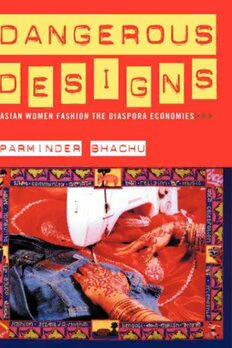
Dangerous Designs: Asian Women Fashion the Diaspora Economies PDF
208 Pages·2003·2.72 MB·English
Most books are stored in the elastic cloud where traffic is expensive. For this reason, we have a limit on daily download.
Preview Dangerous Designs: Asian Women Fashion the Diaspora Economies
Description:
In late-1990s Britain, the salwaar-kameez or 'Punjabi suit' emerged as a high-fashion garment. Popular both on the catwalk and on the street, it made front-page news when worn by Diana, Princess of Wales and by Cherie Booth, the wife of UK Prime Minister Tony Blair. In her ethnography of the local and global design economies established by Asian women fashion entrepreneurs, Parminder Bhachu focuses on the transformation of the salwaar-kameez from negatively coded 'ethnic clothing' to a global garment fashionable both on the margins and in the mainstream. Exploring the design and sewing businesses, shops and street fashions in which this revolution has taken place, she shows how the salwaar-kameez is today at the heart of new economic micro-markets which themselves represent complex, powerfully coded means of cultural dialogue and racial politics. The innovative designs of second-generation British Asian women are drawn from characteristically improvisational migrant cultural codes. Through their hybrid designs and creation of new aesthetics, these women cross cultural boundaries, battling with racism and redefining both Asian and British identities. At the same time, their border-crossing commercial entrepreneurship produces new diaspora economies which give them control over many economic, aesthetic, cultural and technological resources. In this way, the processes of global capitalism are gendered, racialized and localized through the interventions of diasporic women from the margins.
See more
The list of books you might like
Most books are stored in the elastic cloud where traffic is expensive. For this reason, we have a limit on daily download.
